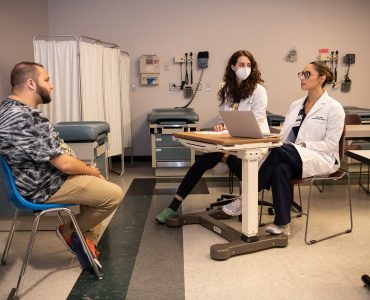
Aadhithi Padmanabhan, JD, encourages students in the newly established Federal Appellate Immigration Clinic at the University of Maryland Francis King Carey School of Law to take on the tough cases. “When you take a case that other people might not take, that’s where you can make the biggest impact,” she said.
Padmanabhan is an assistant professor and director of the new clinic, which is part of the Chacón Center for Immigrant Justice at Maryland Carey Law. The clinic provides students with the opportunity to seek justice for clients before the federal circuit courts and the Board of Immigration Appeals.
“This is wonderful for our clients because there are very few legal services at the appellate level,” said Maureen Sweeney, JD, law professor and director of the Chacón Center. “And it’s great for students because they have an opportunity to get into the federal courts, which helps career-wise if they want to do a federal clerkship.”
The nascent clinic is in what Padmanabhan calls “the building phase.” Spring 2023 was the first semester it was offered, and Padmanabhan says she relied on years of legal experience working on similar cases at the Legal Aid Society and the American Civil Liberties Union of New York as well as the insight of clinicians in Maryland and across the country to shape the syllabus.
“I want to create litigation environments at the law school that mirror my own experiences as a lawyer,” she said.
To that end, the students in the clinic are split into two- or three-person teams — each assigned to work on an appeal in a deportation case.
‘Crime of Moral Turpitude’ Deportation Ground
One of the briefs filed last spring by student attorneys Grace Rudatsikira and Sydney Wilson under Padmanabhan’s supervision seeks to reconceptualize the “crime of moral turpitude” deportation ground, a century-old provision in the immigration code that threatens to sweep in large categories of noncitizens, frequently based on minor misconduct.
Filed in the U.S. Court of Appeals for the Fourth Circuit on behalf of the Sex Workers Project of the Urban Justice Center — considered a leading national expert in providing immigration services to sex workers and survivors of human trafficking — the brief argues that the designation of sex work as “a crime of moral turpitude” is an outmoded way of thinking that should not affect immigration status.
“There is nothing inherently wrong, bad, or immoral about consenting adults providing or purchasing sexual or erotic services,” said RJ Thompson-Rodriguez, JD, managing director of the Sex Workers Project. “A migrant consensually selling or buying sexual or erotic services should have no bearing on their immigration status nor their right to remain in the United States.”
Clement Lee, associate director of immigration legal services at the Sex Workers Project, has high praise for the “keenly analytical minds and encyclopedic knowledge of case law” of the students who filed the brief.
“Maryland Carey Law students authored an amicus brief that convincingly weaved together legal precedent, sociological data, and evolving contemporary norms and attitudes on sex work,” Lee said. “This promises to move the law forward. The Sex Workers Project is proud that our goals align with the Maryland Carey Law students’, ensuring that the experience of actual sex workers plays a role in the court’s jurisprudence and protecting sex workers from the dragnet of deportation.”
‘Sink or Swim Together’
“This is a clinic where we’re all going to kind of sink or swim together,” said Padmanabhan, who wants her students to develop the collaborative mindset that is important to legal practice in the real world. “There’s very few opportunities to develop those skills in law school because it’s so individualized, and that’s something I emphasize in clinic as a way to make the work both fun and manageable.”
Alexis Turner-Lafving, JD ’23, was among the clinic’s first students. She came to Maryland Carey Law after working as a paralegal at a small immigration law firm in North Carolina.
Working with a client in the clinic “feels very similar to working a full-time job at a law firm and this is the big case you’re working on with a supervising attorney,” said Turner-Lafving, who graduated in May and is a law clerk in the Department of Justice’s Sterling Immigration Court. “We’re a team of three junior lawyers meeting with a senior attorney who’s there to give us guidance on how to proceed.”
Padmanabhan’s overarching advice? Persistence pays off.
“One thing about my clinical experience that really shaped the way I lawyer to this day is the philosophy of never giving up,” she said. “A loss is a loss until you can convert it into a win. You just keep going. That’s the ethos I want students in the clinic to develop.”



